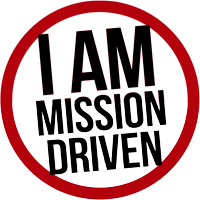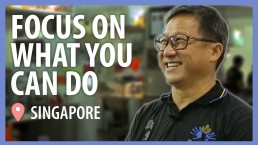Employing the Unemployable. Profitably | Seng Choon Koh, Project Dignity
In this episode of Entrepreneurs For Good I speak with Seng Choon Koh, founder of Dignity Kitchen, an organization whose mission is to build and return the dignity to the disabled and disadvantaged through vocation.
When I arrived to meet him, I thought I had the wrong address as his office is literally in the middle of a hawker market that serves as a live training ground for a wide range of "unemployable" individuals.
It was a wide ranging interview, and one that gets super tactical in areas of process, business planning, and remaining grounded during the tough times.
From 0 to 25 you learn. You get your degree, you learn
25-50 you earn. You earn your money. You earn your reputation
50 onwards you must give back
About the Entrepreneurs For Good Series
Through this series, we speak with Asia based entrepreneurs whose mission it is to bring solutions to the environmental, social, and economic challenges that are faced within the region to learn more about their vision, the opportunities they see, and challenges that they have had to overcome.
It is a series that we hope will not only engage and inspire you, but catalyze you and your organizations into action. To identify a challenge that is tangible, and build a business model (profit or non) that brings a solution to the market.
About Koh Seng Choon
Mr Koh Seng Choon is the founder and Executive Director of Project Dignity, Singapore’s first social enterprise for the disadvantaged and people with disabilities.
The aim is to help these people regain a sense of dignity through their work. Project Dignity comprises of
- Dignity Kitchen – hawker or street training centre for disabled and disadvantaged
- Dignity Mama – second hand bookshop managed by the mothers and their challenged children
- Dignity Cottage - bird’s nest processing for lower functional disabled youth
- Dignity Meal – free meal for foreign workers and the poor
- Dignity Angels – engages professional to support charities and corporate in their corporate social responsibilities
Mr Koh Seng Choon is an engineer by training and holds a MSc in Computer Integrated Manufacturing. His career spans UK, USA, India and China. Authored of three books – Elements of Success: Business, Elements of Success: Education and Elements of Success: Living – of which the first book mentioned is a best-seller in India.
He is also the owner and management consultant of Christopher Benjamin Consultancy Services which help Chinese companies to develop business in India and Indian companies for the China market. He is an adjunct lecturer at SP Jain School of Global Management.
Follow
Website: http://dignitykitchen.sg/
Facebook: https://www.facebook.com/sengchoon.koh
LinkedIn: https://linkedin.com/in/kohsengchoon
About Rich
Driven by the belief that change begins with a single step, Richard Brubaker has spent the last 15 years in Asia working to engage, inspire, and equip those around him to take their first step. Acting as a catalyst to driving sustainability, Brubaker works with government, corporate, academic and non-profit stakeholders to bring together knowledge, teams, and tools that develop and execute their business case for sustainability.
Follow Rich
Website: http://www.richbrubaker.com
Facebook: https://www.facebook.com/rich.brubaker
LinkedIn: https://www.linkedin.com/in/richbrubaker
Snapchat: http://snapchat.com/add/richbrubaker
Instagram: https://instagram.com/richbrubaker
Twitter: http://www.twitter.com/richbrubaker
Contact Rich
[email protected]
Full Interview Transcript
For more interviews from the "Entrepreneurs for Good" series, check out the playlist here.
Stay tuned for more clips and full interviews in the coming weeks.
The Next Big Thing For Entrepreneurs
[In] the last century [the thinking was], if you wanna grow as entrepreneurs, you should find a good opportunity. But today, if you want to be a great company, think about what social problem you could solve.” – Jack Ma, Founder of Alibaba
When looking for leadership on sustainability, and for those who are going to deliver the solutions that are needed, the search typically begins with big businesses like Wal-Mart and Unilever and their leaders. The search tends to focus on firms, and leaders, who have large platforms from which they can announce their commitments to changing products, processes, and people as they execute their vision for sustainability. At times these announcements have been backed up by significant investments in time and energy.
However, as the challenges of maintaining balance between economy, environment, and society has grown more difficult to maintain, it is the role of the entrepreneur as visionary and solution provider that has begun proving the power of business, and markets. They have the power to not only solve crises, but to create a new business model. One that starts with a vision of sustainability at the core, and captures an ecosystem of customers along the way that shows that a “sustainable business model” isn’t an unprofitable one.Take for example the food sector, one that is rife with consumer scandals and resource challenges in China, where large brands have been largely focused on risk mitigation, resource efficiency, and crisis prevention. For traditional “big food” players, the challenge is compounded by the size and scale of their supply chains plus the speed with which China, and other markets, is growing. Firms need to identify, assess, and engage tens of thousands of farmers on one end of the value chain, while creating thousands of new distribution points that will deliver product to the market on the other. There is no time to slow down or go back to do things “right”
For the Hong Kong-based OceanEthix, their aquaculture (fish farming) systems were built with sustainability in mind in an industry that is known for numerous environmental impact, social, and consumer safety challenges. Their system, one that is closed loop and modular, has water efficiency, transparency, and product quality at the core of its design, and their modules are now being deployed at various sites in Asia. For the Shanghai-based FIELDS China, a food delivery platform, it was a business model born from the entrepreneur’s own experience with trying to find clean, safe, food for his family, and has quickly grown into a multi-million dollar business that is scaling into China’s second tier cities.
Entrepreneurs that once occupied the long tail of the economy, and applauded for being “nice” as a result, are now gaining the interest of “traditional” business as they are now seen as market leaders . Leaders who have created products and services with loyal ecosystems of consumers, and markets that are moving from niche to scale. Dynamics that are leading to a shift in mindsets across the board:
- Business leaders are looking at social issues as new markets, and successful social minded enterprises as potential investments .
- Consumers have begun looking for safe, reliable, high-value products, and more importantly they are showing that they are willing to pay a premium for them.
- Employees are now willing to leave comfortable lifestyles and jobs behind for the prospect of building a new model for change.
- Governments are now investing significant time and energy to help solution providers incubate and scale their business models, while looking for ways to decouple their economies from models that are seen as risky, resource intensive, or destructive.
These shifts are helping entrepreneurs validate their vision and markets, creating the awareness needed to help reach consumers, bringing economies of scale and profit, and most importantly bringing exit opportunities.
As China’s economy transitions towards maturity, where conversations of “balanced growth” replace those of “growth at all cost”, the opportunity for entrepreneurs and intrapreneurs to develop new markets for sustainability has never been better .
It is an opportunity being supported by consumers who are willing to pay a premium and governments who now understand that the challenges that have plagued them for years have become a threat to their development models. For those who are able to meet this need, China will only be the start.

